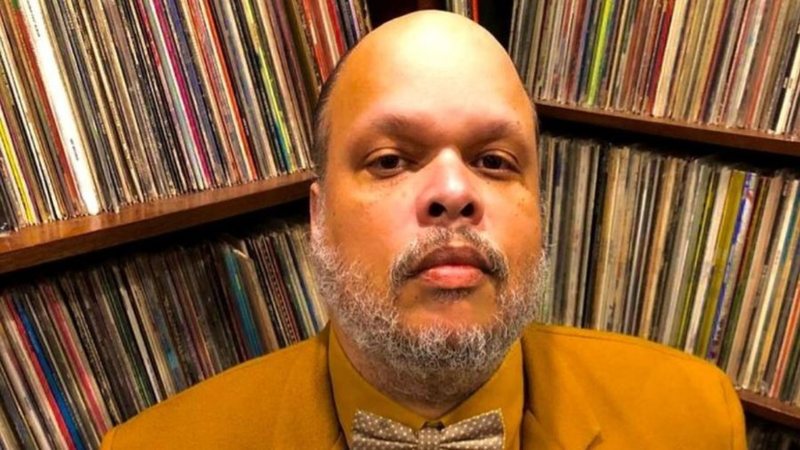The musician also discussed inspiration from films and series for the lyrics of the new album: “someone comes and says: ‘I wrote this song after riding a horse’… oh, come on…!”
Made available on digital platforms on October 20th, Behind the Tea Chronicles is the fourteenth studio album by Ed Motta. The compositions are inspired by TV series and films that he enjoys, also exploring a range of genres such as funk, soul, jazz and musicals from Broadway.
Unsuspecting listeners may find it strange, however, that the songs are all sung in English — as Ed been doing it for some time now. The musician’s current career is directed abroad, but in an interview with Lookhe made a curious revelation: even foreigners would like his compositions to be in Portuguese.
Two explanations were offered by Motta. The first is that only artists “from a Nordic country or Northern Europe” have approval to interpret their works in English. The second is more obvious: the Brazilian language “has its beauty” for foreigners.
“The truth is that the international audience would prefer if I were singing in Portuguese. Foreigners prefer Brazilians singing in Portuguese. International approval for an artist to sing in English is only given when they come from a Nordic country or Northern Europe. Brazilian music is widespread throughout the world and the Brazilian language has its beauty, it has this sexy and tropical imagery.”
Even with all this favorable scenario for a work in Portuguese, Ed He was direct in stating that, if it were up to him, he would never have sung in his mother tongue.
“For me, all my records would have been in English, without exception. I would never have sung in Portuguese in my life. On my first albums, the André Midani, at the time, president of Warner, said that Brazilians couldn’t sing in English because they wouldn’t play on the radio. There was this look, a kind of anti-imperialist defense. My reason for singing in English is purely aesthetic. The type of history I cover in my lyrics is not Latin.”
Inspirations for lyrics
Still during the interview, Ed Motta talked about the inspirations for the lyrics of Behind the Tea Chronicles. As already highlighted, films and series admired by the musician served as references for the verses — more specifically, productions in the detective genre and fiction from the 1970s.
“I give credit to where my inspiration comes from to make it very clear that I am not part of the stereotype of the artist who says that his composition came from the ‘fruit of his experience’. Nothing at all. Those who say this are people who don’t read or watch movies. Someone comes up and says, ‘I wrote this song after riding a horse.’ Ah, go to m….! My songs are the result of the films I watch. My experience is through art. It’s art imitating art.”
Always sincere, the artist commented that he doesn’t even leave the house — which leads to his consumption of art “24 hours a day”.
“I’m not on the street at all times. Going out on the street is hell for me. I don’t want to see life outside. There’s nothing interesting about the world I’ve lived in since I was born. Anywhere in Brazil, anywhere I am in the world, I think everything is bad. I have a nihilistic personality. My inspiration comes from my love, passion and devotion to art. I consume art 24 hours a day. I don’t have time to hit a ball or have a beer. At the bar table, everyone talks nonsense that doesn’t lead anywhere. I prefer to read the complete works of Sydney Sheldon having a chat at a bar table.”
In a statement released at the time of the album’s release, he highlighted some inspirations more specifically.
“Colombo, Barnaby Jones and Streets of San Francisco (in Brazil, São Francisco Urgente) are my favorite series. But I also like English Quatermassthe world’s first science fiction series and produced by BBC, which was a direct inspiration for a track on the album. I was also inspired by old films: especially the film Gaslightin George Cukorand films Jacques Tati, Jean-Pierre Melville It is Basil Dearden, who are some of my favorite directors and gave me a lot of ideas. I wanted to create something truly unique with Behind the Tea Chronicles. Old movies and TV series have always had a profound impact on my imagination and musicality. I wanted to pay homage to these influences and use them as connection points to create an album that is not only musically engaging, but also takes listeners on a nostalgic, cinematic journey. It is an ode to freedom and a commitment to art.”
Source: Rollingstone
Earl Johnson is a music writer at Gossipify, known for his in-depth analysis and unique perspective on the industry. A graduate of USC with a degree in Music, he brings years of experience and passion to his writing. He covers the latest releases and trends, always on the lookout for the next big thing in music.








